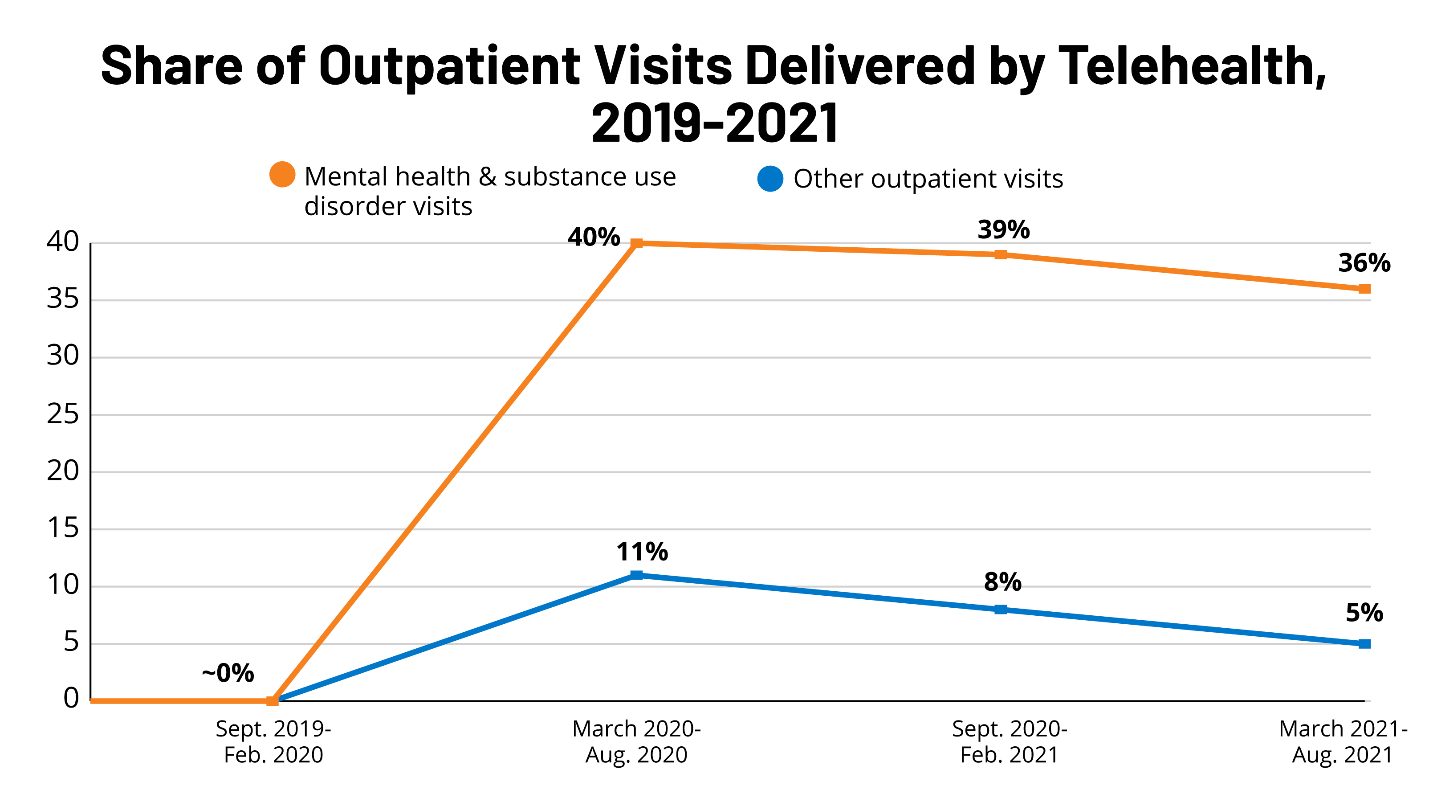Behavioral Telehealth Growth May Mean Opportunities for Inpatient Operators
Never miss a thing.
Sign up to receive our insights newsletter.

Beginning in February 2020, telehealth use increased exponentially in all outpatient categories as patients and providers were brought together by necessity during the pandemic. As the pandemic has receded, traditional medicine has largely returned to in–person delivery; however, telehealth continues to play a significant role in treating patients with mental illness.
It is not clear whether or how much downstream inpatient behavioral health providers will benefit from telehealth and digital outreach. The increased utilization since the pandemic began sheds light on a severely underserved sector that presents significant opportunities across the board.
By the Numbers

Source: KFF Research
Based on the information above, we make the following observations:
- Utilization of telehealth was relatively low prior to 2020, accounting for less than 1% of outpatient visits.
- Telehealth for mental health and substance abuse diagnosis rose significantly during the pandemic. As a percentage of total outpatient mental health visits, the increase in behavioral health and substance abuse telehealth was greater than for other types of outpatient visits.
- After the initial boom, behavioral health and substance abuse telehealth usage decreased slightly, while the percentage of other general outpatient usage of telehealth decreased significantly (over 50%).
Importantly, it is currently unclear how Medicaid and commercial payers will structure reimbursement for behavioral telehealth services in the future. As in other healthcare segments, changes to reimbursement structure could have an impact (positive or negative) on utilization.
What They Are Saying
Management for Acadia, Inc., the largest pure play operator of inpatient behavioral health with 49 acute care facilities, addressed digital telehealth access growth in recent company conference calls:
- “And while I don’t think it will ultimately be a replacement for inpatient care, I think there will be opportunity for us to continue to look at innovation. Any opportunity to leverage technology for the benefit of improving our health outcomes is something we will look at.” Christopher Hunter, CEO Acadia, Inc. – Q1 2022 earnings call
- “Recent studies have indicated nearly half of adults report negative mental health impacts. They need to be able to access someone who can help them. And so we are part of the digital access efforts, but I also think it is happening across the industry.” – Q2 2021 earnings call
Health Care Valuation Takeaways
- Telehealth has evolved as an important entry point and access platform for existing and new patients, many of whom did not historically seek care. This growth will directly or indirectly benefit all mental health providers in the industry.
- Inpatient behavioral health providers will need to be an integral part of the digital behavioral health ecosystem in order to (i) gain access to potential new patients (many of whom may become recurring visitors) and (ii) effectively support their various integrated outpatient programs post patient discharge. These efforts can include implementing digital telehealth programs or partnering with innovative providers.
- To support the valuation of an inpatient behavioral provider, the valuator should evaluate the impact of investment (or partnership) in telehealth infrastructure along with other outpatient programs.
Dig Deeper
For information about health care provider valuations, contact us. We are here to help.
© 2022
This is one in a series of related health care valuation posts:
- Surgery Outmigration Driving Elevated Valuation Multiples in the ASC Segment
- Increased Contract Labor Costs May Lead to Valuation Revisions
- Revenue Growth and EBITDA Multiple Expansion Drove Historical Health Care Investment Returns
- Expanding Supply of Urgent Care Centers Create FMV Considerations
- The Future of US Health Care Profits
- Hospital Expense Statistics Illustrate Significant Labor Pressures
- Hospital Earnings Supported by Fewer Uninsured Patients
- Health Care Services Transaction Volume Declines Below Pre-Pandemic Levels

